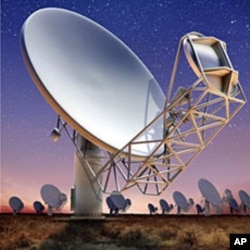Discussions get underway in Amsterdam Tuesday to decide who should host the world’s most powerful radio telescope - South Africa or Australia.
The instrument will be 50 times more sensitive than today's most powerful radio telescope, and is expected to answer key questions on the origins of the universe. The stakes are high for both countries in competition, and South Africa has already invested massively to win the bid.
It is in the middle of the Karoo - an arid, windblown no-man's-land area - that the Square Kilometer Array project, also known as SKA, is going to be settled if South Africa wins the bid.
South Africa’s Deputy Minister of Science and Technology Derek Hanekom is confident. "We have ideal conditions for it," he said.
"We have good astronomers in our country; we have the technical expertise; and we have the ideal climatic and environmental conditions," Hanekom added. "We have eight partner countries in the African continent. For some, they would view that as an opportunity to offer African countries an opportunity to reach a new dimension in scientific endeavor."
Facing stiff competition from Australia, however, South Africa took the chance to display its know-how in advance.
In the Karoo, seven satellite dishes have already been built, and 57 more are will be constructed next year. They represent a project called MeerKAT - which is being billed as the "little brother" of the SKA. It will be the 2nd largest radio telescope in the southern hemisphere after SKA.
The project has cost $300 million so far. And according to project SKA South Africa associate director, Justin Jonas, this project is already a success, even before its completion.
"The MeerKAT itself has attracted enormous interest internationally and in SA [South Africa] itself," said Jonas. "We've already put out proposals for the use of MeerKAT. So in fact, the first five years of the MeerKAT time is already taken up by a massive international team."
It is the home stretch for the two countries that want to host the $2 billion SKA radio telescope. The SKA board of directors is expected to make its selection public in the next few weeks.




